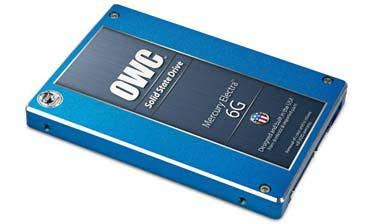OWC's Low-Cost SSD Drive Shines, As SATA Express Looms On Horizon

The Serial ATA International Organization announced this week that it is developing SATA Express, a new hard drive interface that it says will increase transfer rates to as much as 16Gbps and do so more affordably than PCIe-based storage systems.
SATA-IO described the new specification, In a press release issued on Aug. 9, as a combination of existing SATA specs and PCI Express bus technology, and said it will maintain compatibility with existing SATA applications and infrastructure.
SATA-IO also this week released SATA SSD, a specification that for the first time permits solid state drives (SSDs) to connect directly to the main logic board of a device via ball-grid array instead of modular connectors and cables.
The single-chip spec is intended to further reduce the size and footprint of ultra-portable and embedded devices such as Intel's forthcoming line of Ultrabook computers.
Among the first to announce a SATA SSD device is SanDisk, which will offer 64-GB and 128-GB SSDs with theoretical transfer rates of 6Gbps.
While postage-stamp-sized drives are surely coming, there still will be a need for conventional SSDs for years to come. Nicely filling that void at a variety of price points is Other World Computing, a distributor of hardware and accessories based in Woodstock, Ill.
Specializing in products for Apple computers and devices, OWC sent the CRN Test Center a Mercury Electra 6G 240GB SSD, one of its latest value-priced solid state drives.
Next: Fast, Cheap SSDAs
Fast, Cheap SSDAs are the SSD (pronounced "micro-SSD") drives from SanDisk, OWC's Electra 6G has a SATA III interface that's rated at 6Gbps.
To test the drive's actual throughput, we connected it to the SATA bus of an ASRock A75 Pro4 motherboard with AMD's high-end A8-3850 APU, which incorporates four x86 cores running at 2.9 GHz, 400 Radeon cores at 600 MHz, five SIMD units, 20 texture units and 42 additional processors. We ran Iometer on 64-bit Windows 7 Ultimate N with 4GB of 1333 MHz DDR3 memory.
Throughput was impressive, though nowhere close to the theoretical maximum.
Testers observed a maximum transfer rate of 310 MBps and a transaction rate of 9960 IOPS. This was accomplished with 32K byte sequential reads and the outstanding IOs per target set to eight and was sustained over a two hour period.
When file size was reduced to 4K bytes, transfer rate dropped to 89 MBps while transaction rate rose to 22,800 IOPS. Using Iometer and our standard optimization methodology, which gradually increases the number of pending IOs per target until performance falls off, we observed the best performance IOs per target set to eight.
OWC's Mercury Electra 6G 240-GB SSD lists for $449, and would be a good choice for boosting performance of a laptop, or as replacement for portable machines doing media production or running other I/O intensive applications.
It's also available in 120-GB ($203) and 480-GB ($897) capacities. For its outstanding sustained read/write performance and reasonable prices, the Mercury Electra 6G is a recommended product.